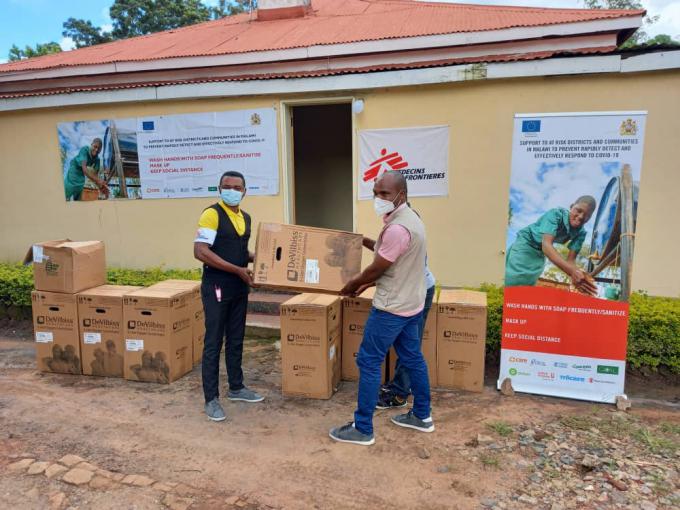Raising Hope Amid COVID-19 Difficult Realities

In the COVID-19 ward at Zomba General Hospital, a man is brought in on an ambulance stretcher, heavily panting and evidently out of breadth. The medics move him move in and help him to the only free bed at the far end of the ward.
The nurses quickly conduct an assessment of the patient, determining from the quick examination that he is suffering from visible signs of COVID-19—his heavy breathing, slurred speech and high fever.
The situation is dire. Three of the only available oxygen cylinders at the hospital are being used on the most severe cases in the ward.
And so, the nurses watch helplessly as the latest patient slowly die. In the 30 minutes that he has been there, they have been unable to record his name or details.
This case is replicated across all public facilities in the country, with medics bringing in critical cases by the hour and health personnel watching the patients die, helpless to assist them due to a lack of vital resources such as oxygen and oxygen cylinders.
The surge in demand for oxygen coupled with a chronic oxygen undersupply is undermining the health system’s ability to cope with the increasing COVID-19 caseload.
With an escalating number of deaths and new infections, the biggest problem facing the country right now is the urgent need for resource to combat COVID-19.
The public health infrastructure is too strained and under equipped to deal with the surging numbers and bed space.
Malawi’s secretary for health is quoted in the media as saying that the health system is “overwhelmed and government cannot meet the health needs of Malawians, let alone with COVID-19.
In declaring a state national disaster due to COVID-19, the country’s President Lazarus Chakwera said “the country was in the fight of its life”.
Between October and early December 2020 Malawi registered a consistent fall in coronavirus infections. From a total of 1,065 active cases on October 3, the country's total caseload dropped to just 45 as of December 7. More than 5,000 people had recovered, while the death toll stood at 185.
However, a surge of cases from late December combined with the emergence of more contagious mutations, pose a new threat. By end-January 2021 daily new infections have gone up to as high as 1,000 per day and deaths averaging 30 per day.
The number of active cases has doubled in the past week alone and the number of deaths and infections in January alone amounts to more than 50 of the totals since the first case was registered on April 3 2020.
Malawi now has the second highest rate of increasing confirmed cases in the world, with cases doubling in just ten days, from 9,400 on January 14 to 21,660 cases on January 28.
Malawi is in the ‘Least Prepared’ group in the 2019 Global Health Security Index, with particularly low scores on response to an epidemic (176th out of 195 countries).
Save the Children mitigation against COVID-19
Save the Children Malawi senior humanitarian programmes manager Steve Kamtimaleka says the organisation has rendered towards at risk districts and communities in Malawi to prevent, rapidly detect and effectively respond to COVID-19
With funding from the European Union Civil Protection and Humanitarian Aid (ECHO), the nine-month project is targeting the districts of Mwanza, Blantyre, Mangochi, Mulanje with a reach of 1,131,389 individuals.
“Our support to the national government, local government authorities, and communities in Malawi is to prevent, rapidly detect and effectively respond to the COVID-19 pandemic thereby reducing morbidity and mortality.
“The intention is also to reduce the spread of COVID 19 by strengthening health facilities, improving access to WASH facilities, supporting national, district and community preparedness and response; ensuring rapid response to protect lives and livelihoods in a gender sensitive way,” he said.
As part of the drive, Save the Children Malawi on January 27, handed over 10 oxygen condensers to Medicines Sans Frontiers (MSF), who are jointly managing the COVID-19 Clinic at Queen Elizabeth Central Hospital in Blantyre.
MSF emergency coordinator Fabrice Weissman noted there is a huge increase in the number of patients in need of hospital care due to the new strain from South Africa that is spreading much faster.
“Because of that, we are faced with a huge demand for bed space and also oxygen which is key in the treatment of COVID-19. We are in a situation where we cannot cope and we have to rely on donations such as these,” he said.
Weissman notes that the high cost of cylinders as well as their limited unavailability in the country has compounded the crisis.
“Which is why this donation of oxygen concentrators from Save the Children is very crucial in this fight because we don’t have to panic about filling the cylinders several times a day. These concentrators are critical for our patients,” he said.
 Malawi
Malawi